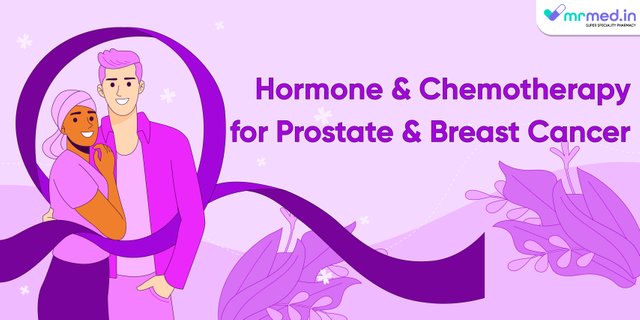Hormone and Chemotherapy for Prostate and Breast Cancer

Prostate and breast cancers are among the most prevalent types of cancer globally, impacting millions of individuals each year. Effective treatment strategies, including hormone therapy and chemotherapy, play pivotal roles in managing these cancers and improving patient outcomes. This article explores the integration of these therapies, highlighting their mechanisms, benefits, and considerations in prostate and breast cancer treatment.
What is the downside of hormone therapy for prostate cancer?
The downside of hormone therapy for prostate cancer primarily revolves around its side effects and potential long-term implications for patients undergoing treatment. While hormone therapy, such as Zoladex 3.6mg Injection (Goserelin Acetate), [https://www.mrmed.in/medicines/zoladex-36mg-injection] effectively targets androgen receptors to suppress testosterone production or activity, thereby slowing cancer growth, it can also lead to several challenges and considerations:
Osteoporosis Risk: Long-term use of hormone therapy can weaken bones and increase the risk of osteoporosis and fractures. This is particularly concerning for older patients or those with existing bone health issues.
Cardiovascular Effects: Studies suggest a potential link between hormone therapy and cardiovascular complications, including increased risk of heart disease and stroke. Monitoring cardiovascular health during treatment is essential for mitigating these risks.
Metabolic Changes: Hormone therapy can lead to metabolic changes such as weight gain, insulin resistance, and an increased risk of diabetes. Patients may require close monitoring and lifestyle modifications, such as regular exercise and a balanced diet, to manage these effects.
Psychological Impact: Coping with the emotional and psychological effects of hormone therapy, such as mood swings, depression, and anxiety, can be challenging for patients and their caregivers.
Resistance and Disease Progression: Over time, prostate cancer cells may become resistant to hormone therapy, leading to disease progression. This necessitates ongoing monitoring and potential adjustments to treatment plans.
Quality of Life Considerations: Balancing the benefits of hormone therapy in managing prostate cancer with its potential side effects requires careful consideration of each patient's overall health status, treatment goals, and preferences.
What is the chemotherapeutic approach to treat prostate cancer?
Indications and Goals: Chemotherapy drugs, such as docetaxel https://www.mrmed.in/molecule/docetaxel or cabazitaxel, are used in advanced prostate cancer cases where hormone therapy alone is insufficient. These agents target rapidly dividing cancer cells, slowing tumour growth and extending survival.
Combination Therapies: Sequential use of chemotherapy with hormone therapy involves using one treatment after the other, while concurrent use means using both treatments at the same time. Both approaches have been shown to improve outcomes, offering synergistic benefits in controlling cancer spread and managing symptoms associated with advanced disease stages.
Side Effects and Management: Chemotherapy's systemic nature may cause side effects like nausea, fatigue, and decreased blood cell counts. Supportive care, including anti-nausea medications and growth factor support, mitigates adverse effects and enhances treatment tolerance.
Can breast cancer be treated with hormone therapy only?
Yes, breast cancer can be treated with hormone therapy alone in certain cases. Hormone therapy, also known as endocrine therapy, is effective for breast cancers that are hormone receptor-positive. This means they have receptors for estrogen and progesterone, which are proteins that can attach to these hormones. These therapies work by blocking the hormones that fuel the growth of cancer cells or by lowering hormone levels in the body.
For early-stage hormone receptor-positive breast cancers, hormone therapy may be used as the primary treatment following surgery (lumpectomy or mastectomy) to reduce the risk of cancer recurrence. In some cases, it may also be combined with radiation therapy.
In metastatic or advanced breast cancer, hormone therapy can help slow down cancer growth, relieve symptoms, and improve quality of life. It is often used as a long-term treatment to manage the disease.
However, hormone therapy alone may not be sufficient for all types and stages of breast cancer. Treatment decisions are individualised based on factors such as tumour characteristics, stage of cancer, and overall health.
What is an integrative approach to cancer care?
Multidisciplinary Approach: Collaborative care involving oncologists, surgeons, radiologists, and supportive care specialists ensures tailored treatment plans, addressing physical, emotional, and quality-of-life aspects of cancer management.
Emerging Therapies: Targeted therapies and immunotherapy innovations, such as monoclonal antibodies and immune checkpoint inhibitors, offer promising avenues in treating resistant or advanced prostate and breast cancers.
Patient Education and Support: Providing patients with comprehensive information on treatment options, potential side effects, and lifestyle modifications is crucial. This approach empowers patients, fosters informed decision-making, and promotes adherence to therapeutic regimens, thereby enhancing their sense of control and confidence in their treatment journey.
By tailoring therapies to individual cancer characteristics and patient needs, healthcare providers maximise treatment efficacy, improve survival rates, and enhance the quality of life for individuals confronting these challenging diseases.